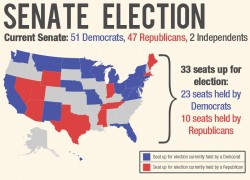
Thirty-three seats are up for grabs in the United States Senate during this election, but Notre Dame professors are still not convinced the Republican challenge to the Democratic majority will be enough to earn GOP dominance in tight races around the country.
The Democratic majority in the current Senate is slim, with just 51 seats to the Republican’s 47. Notre Dame political science professor Geoffrey Layman predicted the fight for the Senate majority would be closer than originally anticipated this year.
“I do expect the Republicans to challenge the Democratic majority, but I think it will be very close,” Layman said. “I think six months or a year ago, there was sort of an expectation that the Republicans would almost certainly gain the majority because of the big seat gains in 2010 in the House, less so in the Senate.”
Compared to 2010, when Republican candidates — especially those from the Tea Party — enjoyed sweeping success in the House of Representatives, Layman said 2012 is more favorable for the Democratic Party. In the past two years, the nation has seen slow improvements in the economy and a more positive national attitude toward the Affordable Care Act than when it was first proposed.
“I think it is certainly a better year than 2010, which was an awful year for Democrats,” he said.
However, more of the seats up for reelection have traditionally been held by Democrats and, with only a few states to swing for a Senate majority, the GOP has been fighting hard in election season. Twenty-three Democratic seats are on the ballot, as opposed to 10 Republican.
Layman cited Missouri, Virginia and Florida as examples of states where Democrats are trying to cling to a Senate seat despite tough opposition from Republican candidates. Sen. Claire McCaskill in Missouri and Sen. Bill Nelson in Florida are both Democratic incumbents trying to keep their jobs, while the Virginia seat is open to new challengers from both parties after the retirement of incumbent Sen. Jim Webb.
“A lot of those seats that the Democrats have to defend, a fair number of them are in red states or at least states where the Republicans are very competitive,” Layman said.
Political science professor Peri Arnold also pointed to close races in Wisconsin, Pennsylvania and Ohio. Even Indiana, traditionally a Republican state, has become a more spirited battle this year.
“The fact that Indiana is contentious is a signal that the Republicans are doing less well than they expected to do originally,” Arnold said.
As they make their decisions, voters’ concerns in the Senate races mirror the most important issues in the presidential race, Arnold said.
“They’re worried about the economy and economic growth and jobs … so that’s a major pitch, saying, ‘Vote for me, I’ll contribute to a better economy,’” he said. “It isn’t like elections are rifle shots, one issue, one concern. But certainly the economy creates a climate.”
Layman also said the economy was the most important issue for voters in 2012. However, he said some states have seen other significant conversations come up in debate.
“The feasibility of national health care and sort of the size and role of the federal government have been the big issues,” he said. “Then in a couple of key races like Missouri and Indiana, abortion has unexpectedly reared its ugly head.”
